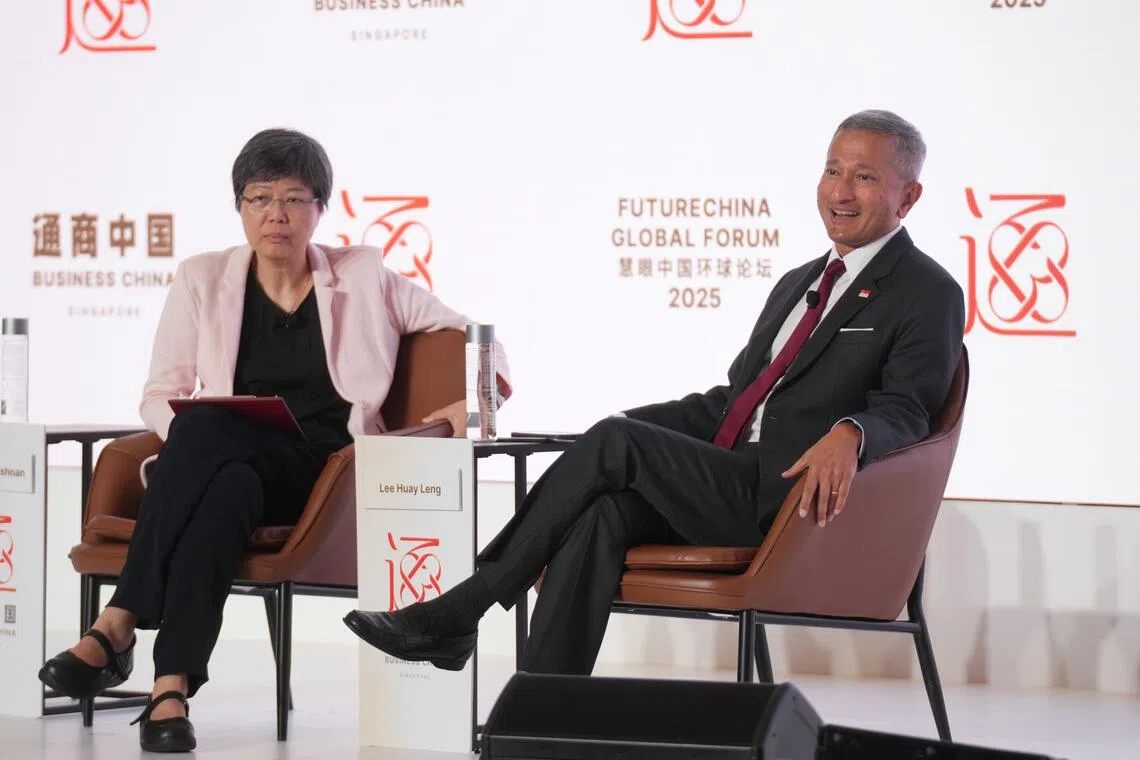Singapore will be useful to global partners, but not be made use of: Vivian Balakrishnan
Sign up now: Get ST's newsletters delivered to your inbox
![CMG20250919-ChiaTY04/谢智扬/温伟中/FutureChina Global Forum 2025.[Marina Bay Sands]
11:55 - 12:35
Fireside Chat with Minister Vivian Balakrishnan
Vivian Balakrishnan
Minister for Foreign Affairs of Singapore
MODERATOR
Lee Huay Leng
Editor-in-Chief, Chinese Media Group, SPH Media](https://cassette.sphdigital.com.sg/image/straitstimes/76aa81e0a7bb3ae9b89f237594b274bbd545dfb5cdd9221aecdb81bfe3b94d43)
Foreign Minister Vivian Balakrishnan stressed that Singapore's approach is one of consistency and honesty with the US and China.
PHOTO: LIANHE ZAOBAO
Follow topic:
- Singapore must stay open and honest for business amid global power rivalry, maintaining consistent ties with both the US and China, said Dr Balakrishnan.
- Dr Balakrishnan highlighted Singapore's relationship with both countries, emphasising its independence and value proposition as "same same but different".
- Singapore aims to avoid becoming a proxy war arena and embraces technology like AI, renewable energy, and biotech to thrive globally.
AI generated
SINGAPORE – Amid sharper rivalry between global powers and heightened geopolitical uncertainty, Singapore must hold fast to its fundamentals of staying open to all and being honest for business, said Foreign Minister Vivian Balakrishnan.
Speaking at the FutureChina Global Forum on Sept 19, Dr Balakrishnan stressed that Singapore’s approach is one of consistency and honesty with both the United States and China. He added that Singapore and its regional neighbours must guard against becoming an arena for proxy wars.
The international system is in a period of flux, he noted at the event held at the Sands Expo and Convention Centre.
The US, once a dominant post-war power that underwrote a rules-based order for decades, now questions the costs of sustaining that role. At the same time, China, which has risen rapidly, wants to reclaim a share of global gross domestic product (GDP) that it sees as rightfully earned, saying its success comes from “hard work and savings”.
In such an environment, Singapore must stay open to all, regardless of where business or technology originates, Dr Balakrishan said. He emphasised the need for the Republic to maintain honesty in commerce and preserve its reputation as a trusted, high-efficiency hub.
“Singapore must remain open to both American and Chinese businesses. I cannot exclude you on the basis of where you came from,” he said, adding that the country wants only honest business here.
On China, Dr Balakrishnan said Singapore’s relationship with Beijing is unique, shaped by deep cultural and linguistic ties, but also by the need to remain distinct. Singapore’s value lies in being independent, which allows it to remain useful and relevant.
At the highest levels of government, both sides understand this dynamic, with the relationship built on mutual regard, respect and trust.
“Singapore’s value proposition is not to be yet another medium-sized Chinese city with six million people. Our value proposition is to be ‘same, same, but different’,” he said, quoting former manpower minister Lim Swee Say.
Turning to the US, Dr Balakrishnan said that most people still underestimate the importance of American investments to South-east Asia. America, he noted, has invested more in the region than in China, India, Japan and South Korea combined.
Access to American technology and multinational corporations has also been crucial in driving growth in Singapore and the region, he said.
“There’s no way our per capita GDP now would be what it is if we did not have access to American technology (and) American markets, and if we were not a useful host (to thousands) of multinational corporations,” he said.
But Singapore also cannot be “yes sir, yes sir, three bags full” to everything the Americans want either, Dr Balakrishnan said, referring to the importance of maintaining independence even while benefiting from close ties with Washington.
He stressed that the message he delivers to both China and the US is always the same, and that Singapore does not whisper one version to one side and a different version to the other.
“We will have to say no from time to time, but when we say no... it’s not because the other side is instigating. I will be useful, but I will not be made use of. I will be honest, I will be helpful,” he said, adding that this consistency has so far served Singapore well in its relations with both powers.
Dr Balakrishnan also underlined the importance of technology as the decisive factor for whether nations thrive or fall behind. He pointed to three revolutions under way: artificial intelligence (AI) and digitalisation, renewable energy and biotechnology.
For AI, the Americans have a lead of “maybe a couple of months, a year or two”, he said. In renewable energy, China is ahead in areas such as electric vehicles, solar panels and civilian nuclear technology, while in biotechnology, he said, it is a “very, very close race”.
His hope, he added, is that the world will continue to operate on a “common stack” of science and technology, with countries competing to innovate. Singapore, for its part, will strive to remain open, rational and disciplined in embracing such advances.

Foreign Minister Vivian Balakrishnan during a fireside chat at the FutureChina Global Forum on Sept 19, moderated by Ms Lee Huay Leng, editor-in-chief of SPH Media’s Chinese Media Group.
PHOTO: LIANHE ZAOBAO
When asked if the other Asean countries share this approach, Dr Balakrishnan noted that each state in its own way is trying to remain open and have a more balanced set of relationships with other countries, adding that each country will make a slightly different adjustment.
Still, he added, there is a shared understanding across the region not to repeat the problems of the past, recalling how South-east Asia became an arena for proxy conflicts during the Cold War.
“We’re all very clear. We don’t want to repeat that, we do not want to make ourselves an arena for other people’s wars,” he said.


